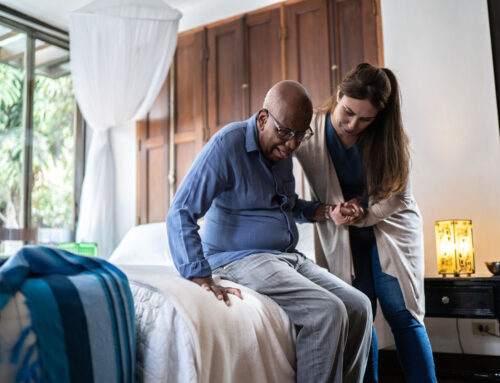May is the month to celebrate Mom. During Mother’s Day, we reflect on all that she gave us, all she gave up for us, and the impact she had in shaping our lives. These memories become even more special when this significant person in our lives is living with a serious illness. At some point, we begin to change roles when, as her adult children, we become the ones to watch over her. Knowing when Mom may need extra care is a question we will all face as our parent grows older. So when is it time to talk about extra care for Mom? Here are some common signs to help you know when it may be time to talk about getting the care Mom needs.
Struggling with Personal Care. Does Mom seem to be struggling with caring for herself? Are you noticing signs that she may not be as pulled together as she once was? Has her personal grooming changed?
– Hair not shampooed or styled?
– Clothes seem stained?
– Is she staying in her pajamas and not getting dressed in the morning?
These could be signs that she is no longer able to care for herself or her illness has progress to the point where she no longer has the strength.
Changes in Cognitive Ability. Have you noticed changes in her cognitive ability?
– Does she seem confused or more forgetful?
– Is she having trouble following conversations or remembering people close to her?
– Is she participating less during social interactions?
– Is she having trouble with problem solving?
– Are these issues severe enough to interfere with daily life?
Cognitive changes could be attributed to a progressing illness or signs of mental decline.
Behavioral Changes. Have you noticed personality changes or changes in her behavior?
– Is she showing signs of restlessness and agitation, especially at night?
– Does she seem confused or disoriented?
– Is she becoming suspicious?
– Is she becoming demanding?
Behavioral changes can be signs of progressing illness or memory loss.
Changes in Activity Level. Are you noticing a decline or change in her daily activities?
– Is she sleeping more?
– Is she spending more time in her favorite chair?
– Does her home seem to be neglected?
– Is there little or no fresh, healthy food or lack of appropriate food supply?
– Is she having mobility issues?
– Is there unopened mail?
Behavioral changes could be a clear indication that your mom’s serious illness is progressing.
Sings of Declining Health. Are you noticing that her overall health seems to be declining?
– Has she been to the ER in the past 3 months?
– Does she seem to be losing weight?
– Has her appetite changed?
– Are there noticeable signs of falling, like unexplained bruising?
– Does her medication not seem to be working as effectively?
– Is she having more frequent infections?
Any of these changes could mean that your mom’s illness is progressing. Recognizing that your mom’s serious illness is impacting her ability to care for herself without support is a painful realization. It’s a place we dread and a role we don’t want to see change. To witness the woman who cared for you, guided you and provided for you suddenly in need of help is devastating. But it’s also a journey you don’t have to face alone. You can talk to your mom’s physician about an evaluation from Roze Room or contact us directly to understand the care and support available. We are here to answer any questions you may have and help ensure your mom gets the care she needs.





